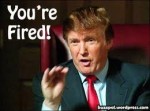 When you used to look around the cubicles at work, did you ever stop and wonder if this co-worker or that co-worker had ever been fired?
When you used to look around the cubicles at work, did you ever stop and wonder if this co-worker or that co-worker had ever been fired?
For many workers, the pink slip has come in an unceremonious way all too often, leading them down a trip to the unemployment line. Whether it was due to bad performance, an issue with a co-worker, or just not seeing eye-to-eye with the boss, they were dismissed.
In the event you find yourself in this position now as you search for a new job, there are some important factors to keep in mind when called in for a job interview.
Among them are:
- Accept reality â Getting fired from a job is one of the toughest things you can go through. Yes, there is a difference between a firing and getting laid off from a job mainly that many layoff victims are oftentimes kept in their companyâs plans should conditions improve where they can be brought back. How many times do you see an employer re-hiring a fired employee? The first and most important thing for you to do is accept what happened, take a short amount of time to deal with it, and then move on. Carrying a grudge for an extended period of time can impact you when you go back out on the interview trail, therefore lessening your chances for getting another job;
- Covering the time gaps â Many individuals have gaps on their resume that can easily be explained away. Whether it was a layoff, taking time off to go back to school or for maternity leave, a sickness, it can be relatively easy to explain the time off. When it comes to being fired, however, this is where it gets tricky. Should you lie and say you were actually laid off or skip around the subject altogether? By all means, do not lie. This is a smaller world than many people think, and such lies can come back to haunt you if your potential or new employer finds out. If asked about why you were fired, briefly explain your side of the issue and go from there;
- Point out company you worked for â The last thing you want to do when interviewing for a job is bad-mouth your previous employer. That being said, it is okay to point out factual information about why you were fired. Sometimes firings happen as a result of companies being sold, downsizing, or another method whereby you did not have a say in the situation. You or other individuals may have viewed your dismissal as a firing, where in fact you actually were a layoff victim, something that does make a difference. On the other hand, if your prior employer had some issues with you and/or other employees and you got caught up in them, explain them in the proper manner without carrying a grudge;
- Admit any wrongdoing â Most employees do not go out of their way to get fired. In the event you were fired from a job and it comes up during a job interview, let the interviewer know what you learned from the experience and how it has changed your approach to work. While it may not get you the new job, it will at least give the interviewer pause to think that you may be worth the risk and have in fact learned from your previous employment situation. Many employers are willing to give an individual a second chance if they see sincerity and that the candidate did in fact learn a lesson from a job firing;
- Show appreciation for a second chanceâ Lastly, make sure you learn from the firing, but then put it in the past so that it does not impact you going forward. It can certainly be tough to transition from being fired to having to look for another job, but it is the reality most people face. By hitting the job trail again and not sulking on your couch, you have already won half the battle.
Getting over a firing and finding a new job definitely takes time and effort, but the end result could show you that the firing was actually a blessing in disguise.
Photo credit: inlandpolitics.com
Dave Thomas, who covers among other subjectsâ business phone service, writes extensively for Business.com, an online resource destination for businesses of all sizes to research, find, and compare the products and services they need to run their businesses.